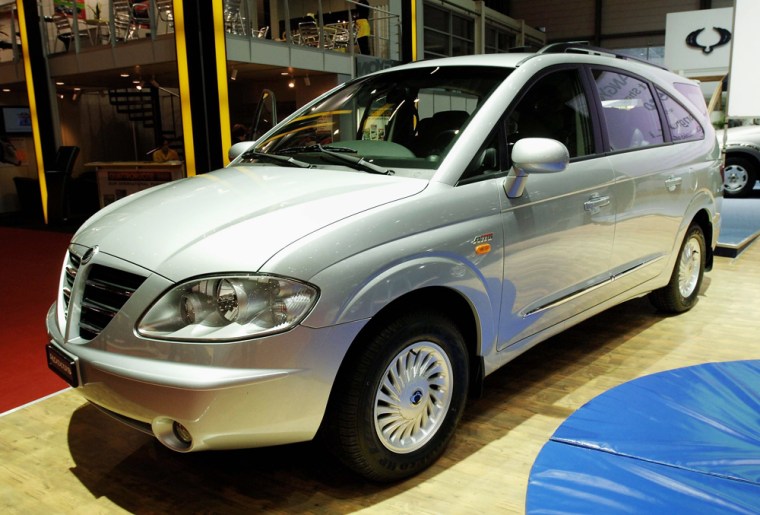Diesel is still sweeping Europe. Hybrids are catching on in North America and Japan. But these trends are only short-term, as the industry prepares for the day the world’s fuel reserves dry up, some auto engineers said at the 75th International Motor Show in Geneva.
Nearly every automaker is here showing off its latest hybrid cars, fuel cell models or electric prototypes, along with the latest diesel options.
“Diesel is popular in Europe, clearly, but it’s a short-term trend,” said Laurent Aebi, a product specialist at Honda Motor Co., which was displaying its new FCX fuel cell car, powered by an electric motor that uses hydrogen as its energy source. “I give it another 10 years maximum. After that it will be the hybrid car. But both the diesel car and hybrid car are a transition as we head to fuel cell cars or pure electric cars.”
Yoshio Ishizaka, an executive vice president at Toyota Motor Corp., the world’s second-biggest carmaker, went further. “Hybrid is really not an intermediate technology," he said, predicting it would even power sports cars some day. "We think hybrid is the technology we have to see for the future.”
Toyota is exhibiting its successful Prius gas-electric hybrid, while Volkswagen is featuring its new Golf Bifuel, which runs on gasoline or natural gas. GM is displaying its concept Sequel car with hydrogen technology, and Honda’s FCX is being shown off on a giant podium complete with glittering water pool.
Lexus is unveiling its 270-horsepower luxury RX400h, the first performance SUV hybrid — which can go from 0-60 mph in 7.6 seconds. This SUV, with a 3.3-liter gasoline engine combined with hybrid synergy drive, goes on sale in the United States in April.
The long-term energy picture
Currently, gasoline accounts for 98 percent of energy used in transport. The world consumes about 80 million barrels of oil a day, a number that continues to increase. American consumption alone is expected to grow nearly 50 percent over the next 20 years.
Estimates vary on when production will begin to decline. Some believe it is imminent, saying discoveries of oil have slowed and little is left to be found. Others believe oil will remain abundant for at least several decades and new extraction technologies will ensure plentiful supplies for a long time.
“War in Iraq, no war in Iraq. We are still looking at long-term solutions,” said Yves Dubreil, vice president-deputy director of vehicle engineering at Renault.
“We the manufacturers need to be ready and find a solution for any political, economical or ecological crisis,” Dubreil added. “The world’s reserves are running out, there is no getting around that. Maybe in 100 years but probably a lot less.”
Hybrid cars draw power from at least two energy sources, typically a gas or diesel engine combined with an electric motor. Surplus engine power and energy produced by braking are used to continually recharge the vehicle’s battery.
Automakers are trying to convince consumers that hybrids can be just as powerful as traditional vehicles, but Dubreil says unless they save consumers money, they are unlikely to catch on.
Honda says that because of the relatively new technology, its hybrid Civic, for example, costs about $2,000 to $3,000 more than a comparable non-hybrid Civic.
“The performance today of hybrids is not better than diesel in terms of economy, speed and power,” Dubreil said. “And our problem is that we cannot change the behavior of people on our own. We can only offer them hybrid cars. But the hybrid is just getting started. Does it have a future? For that we need a crystal ball.”
The diesel debate
While carmakers work on more economical hybrids, European companies say diesel remains the cleanest, most economical option.
“We are convinced that the future of diesel is just beginning,” declared Eckhard Cordes, head of DaimlerChrysler’s premium Mercedes Car Group.
He outlined ambitious plans to expand Mercedes-Benz’ diesel lineup 70 years after it became the first carmaker to offer diesels as standard equipment.
“There is a clear trend towards the clean, economical and sporty diesel engine,” he said. “Over the past few months registrations of diesel-powered passengers cars across Europe as a whole outstripped petrol vehicles for the first time ever.”
Indeed, in Europe diesel accounts for more than 50 percent of new cars sold.
“There has been very rapid growth in the last 10 years,” said Adriane Brown, president and CEO of Honeywell Transportation Systems, a $4.3 billion business that produces turbochargers for both diesel and gas-powered engines. “We expect that to reach 56 percent by 2010.”
Even Toyota is hedging its bets. It is working hard to boost the percentage of diesel-powered cars it sells in Europe, which currently accounts for around 36 percent of its sales. It is also rolling out a new 2.2-litre diesel motor it makes in Poland.
A contrarian view came from General Motors Europe President Carl-Peter Forster, who said European sales of vehicles with gasoline engines could rebound due to climbing costs of building diesel engines to meet new emissions standards.
“Diesels will be very expensive engines,” he said. “I think we should expect the gasoline engine, to a certain extent, to bounce back.”
The popularity of diesels in the U.S. market remains constrained by environmental standards, access to fuel and many customers’ perception that they belong in trucks, not cars.
“In the United States, there has been a visceral rejection of diesel by baby boomers who were turned off by the bad performance of the first diesel cars,” Dubreil said. “The high-tech X and Y generations will get attached to the hybrid idea, skipping the diesel phase.”
